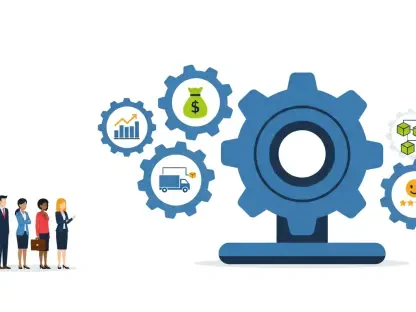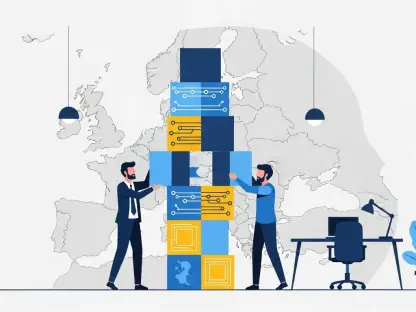IBM has recently announced its intention to donate three open-source AI-related projects to the Cloud Native Computing Foundation (CNCF), aiming to further support AI developers in their efforts to prepare data for training language models and streamline interactions with AI agents. This significant announcement was made by Sriram Raghavan, Vice President of IBM Research AI, at the inaugural All Things Open AI conference. The three projects slated for donation are the Data Prep Kit, Docling, and BeeAI.
Advancing Data Preparation and Document Processing
Data Prep Kit: Streamlining Unstructured Data
The Data Prep Kit, introduced in 2024, is designed to speed up the preparation of unstructured data for large language model (LLM) application development. This is accomplished by cleaning and enriching data for various model-related processes, including pre-training, fine-tuning, and retrieval-automation generation. This tool enables developers to handle large amounts of unstructured data more efficiently and effectively, making the process of training and developing language models more streamlined and less labor-intensive.
By donating the Data Prep Kit to the CNCF, IBM emphasizes the importance of accessible tools that can enhance the data preparation phase of developing AI applications. This move aligns with the broader goal of democratizing AI development resources, ensuring that both large corporations and individual developers have access to tools that facilitate their work with sophisticated models. The Data Prep Kit stands to be a pivotal resource within the open-source community, driving innovation and promoting collaborative development efforts.
Docling: Simplifying Document Conversion
Docling, now open-sourced, is focused on simplifying document processing by converting diverse formats like PDFs into easily digestible files for foundation models such as LLMs. This project addresses a common challenge faced by developers: the need to handle and process a wide variety of document formats that are essential for training models. By streamlining the conversion process, Docling reduces the time and effort required to prepare documents for AI models, making the integration of such resources more seamless.
An open-source addition like Docling is expected to benefit numerous projects that rely on clean and structured data. Its ability to convert various document formats into a standardized form will likely enhance the efficiency of many AI development processes. The simplification offered by Docling stands to create a ripple effect, improving the quality and accessibility of data used by developers globally, and thereby fostering robust AI model creation.
Facilitating AI Agent Development
BeeAI: Enhancing AI Agent Creation
The third project, BeeAI, assists developers in discovering, running, and building AI agents using frameworks like CrewAI, LangGraph, and AutoGen. This tool aims to make the process of developing AI agents more intuitive and accessible, reducing the barriers developers often face when attempting to create sophisticated AI models. By incorporating various frameworks, BeeAI provides a versatile platform for AI agent development, accommodating a wide range of needs and preferences within the development community.
IBM’s donation of BeeAI to CNCF represents a strategic move to bolster the development of AI agents across different sectors. The project’s capacity to integrate multiple frameworks offers developers the flexibility needed to experiment and innovate without being constrained by specific tools or platforms. This will likely spur greater creativity and efficiency in AI agent development, propelling the evolution of more dynamic and capable AI systems.
A Commitment to Open-Source Contributions
IBM’s decision to donate these projects is part of a broader commitment to making AI more accessible and reinforcing the company’s long-standing dedication to open-source contributions. IBM has been a pivotal player in the AI space since the term AI was first coined in 1955, evolving from early chess-playing machines to sophisticated contemporary LLMs. The introduction of the Granite family of foundation models underscores IBM’s continuous contributions to the AI ecosystem.
Furthermore, the collaborative efforts between IBM Research and Red Hat, resulting in the launch of InstructLab—an open-source framework for fine-tuning and collaborating on LLMs—demonstrate IBM’s proactive role in advancing AI technologies. These endeavors reflect the company’s belief in the importance of open-source frameworks as a means of driving the rapid pace of AI innovation. Raghavan’s optimism about the future potential of open-source AI is evident in these strategic contributions.
Future of Open-Source AI Innovation
Accelerating Industry-Wide Adoption
IBM’s approach points to a significant shift in the AI industry: the transition from proprietary models to usable open-source models and frameworks within a relatively short timespan. This shift is crucial in enabling a wider range of developers to participate in groundbreaking AI work, which was previously restricted to those with access to high-end, proprietary technologies.
The donation of these three projects is set to facilitate the broader adoption of open-source AI tools, prompting a cultural change within the industry. By providing powerful, accessible resources, IBM not only champions the democratization of AI development but also paves the way for future innovations driven by collective contributions. This openness is anticipated to drive greater industry-wide collaboration and technological advancements.
Collaborative Efforts and Economic Potential
IBM recently revealed its plan to donate three open-source AI-focused projects to the Cloud Native Computing Foundation (CNCF) in an effort to bolster AI developers. This initiative is aimed at aiding these developers in data preparation for training language models and facilitating smoother interactions with AI agents. The exciting announcement was delivered by Sriram Raghavan, Vice President of IBM Research AI, at the first-ever All Things Open AI conference. The three projects that are being donated are the Data Prep Kit, Docling, and BeeAI. The Data Prep Kit is designed to assist in cleaning and organizing data to ensure it’s ready for AI training. Docling is geared towards improving the way documents are processed and understood by AI, while BeeAI focuses on simplifying the creation and management of AI agents. This move underscores IBM’s commitment to supporting the AI community by making advanced tools more accessible and fostering innovation in the field of artificial intelligence.









